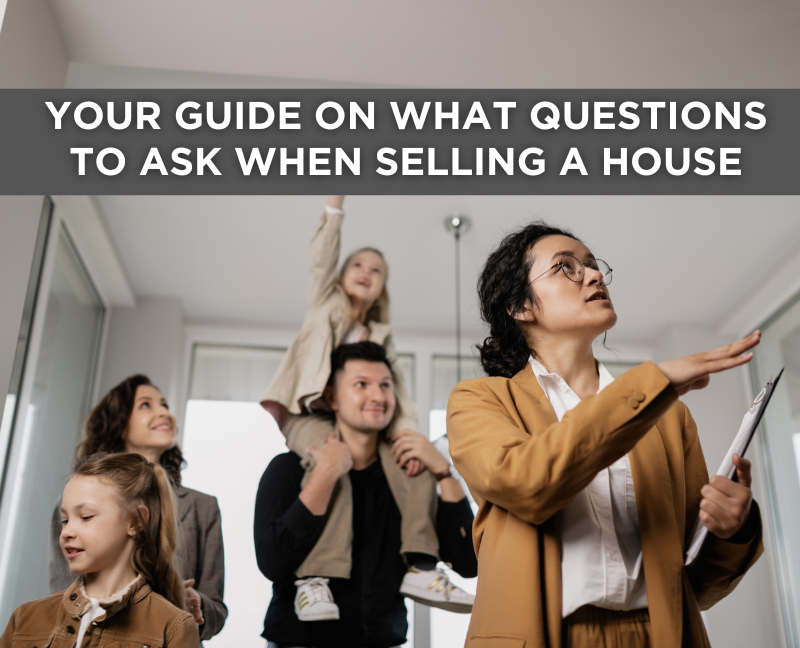Selling a home is not only a huge decision to make, but also a complicated process to take. If you want to simplify the journey while increasing your earning potential, the key is to get yourself ready.
Wondering what those questions are?
Don't worry! In this post, we've compiled all the questions you should ask before putting your property on the market.
Questions To Ask Before Selling Your Home
Have you considered putting your house up for sale soon? Before moving on to the next step, you must ensure you have answered these essential questions about selling a house.
Below are the following questions about selling a house:
1. What Season Is Ideal For Selling A House?
Selling your property is possible year-round, but some months are more accessible, faster, and more rewarding. Home buying is highest in spring and summer and lowest in fall and winter.
Selling your home in June, May, or July maximizes house profits. Homes sold in June and May earn 9.2% and 7.4% more than average. The day you list your home matters, too, according to data. On Thursdays, homes sell faster and for more money.
However, real estate is very localized, so the ideal selling period depends upon your market and homeowner's situation. Think about:
- Selling or buying real estate in your area depends on demand. Market your home in a seller's market to maximize revenues and decrease time.
- You must know your mortgage loan payment. Remember, you stand to make more money the more you have paid off.
- Both buying and selling a home cost money. You should have enough money to cover transaction costs.
- Before marketing your home, check local market trends like active listings and median sale prices.
2. How Much Time Will It Take To Sell My Home?
The time to sell depends on location and housing market conditions. Listing price, home condition, and marketing and staging skills also matter. According to NAR data, the average home is on the market for 62 days. It varies widely by state. You should know how fast your home will sell in your market.
3. How Much Is The Value Of My Home?
Condition and demand for similar homes impact your home's value. It would be best to look at comparable sales to estimate the value of your home. They should match your size and condition. These "comps" help a real estate agent price your home. Alternatively, an iBuyer might buy your house without listing it.
4. How Much Does Selling My Home Cost?
Selling a house has several costs. Many don't require an upfront payment, which is good. Instead, many come from closing sales revenues. Typical fees are 10% of your home's sale price.
These include:
- The real estate agent's commission (5 to 6%)
- The closing costs (1 to 3%)
- The seller concessions (1 to 2%)
- The homeownership and overlap costs (1%)
- The repair costs (varies)
Selling to an iBuyer, skipping the real estate agent, or selling as-is can reduce these fees. A home that needs lots of repairs will sell more slowly.

5. Should I Fix The House Before I Put It Up For Sale?
Many homebuyers want a "move-in ready" property with minor repairs. Younger buyers (76%) need a move-in ready house. Cosmetic repairs increase house value, so make repairs before selling.
Fix severe faults like a roof or AC unit, or boost your rate. Most purchasers won't pay top dollar if massive, expensive projects are coming.
Seller inspections speed up repairs. For a few hundred dollars, home inspectors can check for issues. The report can guide pre-listing repairs. This can increase property value and speed inspections. Your state may require inspection issues disclosure.
6. Do I Need To Work With A Real Estate Agent?
Using a realtor has its own perks and cons. One advantage when working with a real estate agent is that they can help you sell your home faster. Listing, photography, showings, marketing, and closing are some of their services that can make your home-selling journey easier and smoother. They also have local market data to assist you price and marketing your home properly.
Pro Tip: Before hiring a real estate agent, be sure to research their services first. Look at past customer reviews to ensure they can provide the service you want. You may also seek referrals from family, friends, and coworkers.
7. When Should You Call A Home Inspector?
A seller can inspect your home before listing. Some sellers do this, but it might help you prepare your home for sale. Even if you do, a home inspection is usually required after you accept an offer. After hiring a local inspector to assess their property, the buyer may request that you credit them for a few repairs.
8. What Should I Do If My House Isn't Selling?
The thing is, you may not be able to sell your home immediately. If that's the case, the first thing to check is the pricing as it may be overpriced for the market. Try to adjust the listing price based on recent similar transactions. Stage or fix any issues that prevent purchasers from buying your property.
Also, make sure your agent has marketing experience and local contacts. This boosts home visibility and sale potential. You may also remove the home from the market until local conditions improve.
9. Is It Possible For Me To Bring My Favorite Lighting Fixture Or Other Home Feature With Me?
As much as possible, you need to leave any fixture attached to the house. That might include built-in storage, shades, door hardware, etc.
However, if there's any installed appliance that you want to bring with you, you need to tell that to the buyer and state it in the contract.
Can you think of more questions to ask before selling your property? If yes, feel free to share them in the comments!

